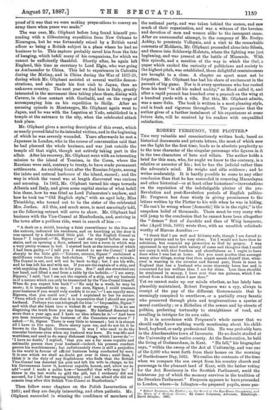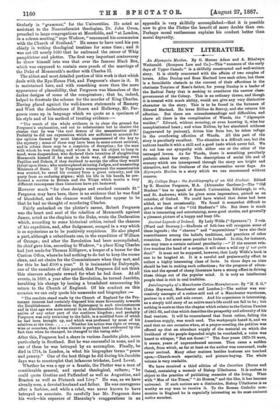ROBERT FERGUSON, THE PLOTTER.*
THIS very valuable and conscientiously written book, based on historical documents and private letters, the most of which now see the light for the first time, lands us in absolute perplexity as to the true character of the singular personage who figures in it in the two characters of hero and villain. The author holds a brief for this man, who, for aught we know to the contrary, is a relative or ancestor of his ; but he has the judicial rather than the advocate's mind. He weighs and sifts evidence ; and he writes moderately. It is hardly possible to come to any other conclusion than that he has succeeded in removing Macaulayan and other historical—or at least other historians'—incrustations on the reputation of the indefatigable plotter of the pre- Revolution and post-Revolution periods of English politics. Mr. Ferguson has done wisely in giving prominence to the letters written by the Plotter to his wife when he was in hiding. "He can't be wrong whose [domestic] life is in the right," is the unspoken belief of thousands. There must be very many who will jump to the conclusion that be cannot have been altogether the " demon " first of Jacobite and then of Whig lampoons, who (April 16th, 1683) wrote thus, with an unselfish solicitude worthy of Marcus Aurelius :— " I thank God I am well and hitherto safe, though I am forced to be very private and to lye very close. Yet I would not have thee be solicitous, but committ my protection to God by prayer. I was oppressed in my mind with variety of cares and thoughts that I could not carry it with that freedom and cheerfulness as I ought to have done when I was last at home. Bat you must pardon that amongst many other things, seeing that thou mayst assure thyself that, what- ever is wanting in the exterior and formal part, there is none in England that has a husband who more sincerely loves her and is concerned for her welfare than I am for thine. Lest thou shouldst be straitened in money, I have sent thee ten guineas, which I re- ceived from a friend since I saw thee."
Yet we cannot make up our minds whether, as has lately been plausibly maintained, Robert Ferguson was a spy, always in receipt of the pay of the different Governments that he seemingly conspired to overthrow, or a partially crazy fanatic who preserved through plots and tergiversations a species of moral continuity ; or a Richelieu of the sewers and by-streets of politics, preferring tortuosity to straightness of road, and revelling in intrigue for its own sake.
It is in accordance with Ferguson's whole career that we should really know nothing worth mentioning about his child- hood, boyhood, or early professional life. He was probably born in the Aberdeenshire town of Inverurie. He no doubt studied at the University of his native county. At the Restoration, he held the living of Godmarsham, in Kent. "He fell," his biographer says, " within the sweep of the Act of Uniformity, and was one of the 2,000 who went forth from their homes on the morning of Bartholomew Day, 1662. We realise the contrasts of the time
when we compare the son swept from his country church and parsonage in the pleasant land of Kent, with the father voting
for the Act Reecissory in the Scottish Parliament, amid the boisterous joy of which the memory survives in the tradition of the Drunken Parliament." Ferguson appears to have proceeded to London, where—in Islington—he prepared pupils, more par- e Robert Ferguson, the Plotter ; or, the Secret of the Rye-House Conspiracy, and the Story of a Strange Career. By Jam. Ferguson, Advocate. Edinburgh David Douglas. 1887. tioularly in "grammar," for the Universities. He acted as assistant to the Nonconformist theologian, Dr. John Owen, preached to large congregations at Moorfields, and "at London, in a solemn meeting," says Wodrow, "renounced hie communion with the Church of Scotland." He seems to have used his pen chiefly in writing theological treatises for some time ; and it was not till nearly 1680 that he embraced the career of Whig pamphleteer and plotter. The first very important controversy he threw himself into was that over the famous Black Box, which was supposed to contain sure proofs of the marriage of the Duke of Monmouth's mother with Charles IL The ablest and most detailed portion of this work is that which deals with the Rye-House Plot, and Fergneon's share in it. It is maintained here, and with something more than the mere appearance of plausibility, that Ferguson was blameless of the darker designs of some of the conspirators ; that he, indeed, helped to frustrate the scheme for the murder of King Charles. Having placed against the well-known statements of Ramsey and West the declarations of Bourn and Holloway, Mr. Fer- guson sums up in language which we quote as a specimen of his style and of his method of treating evidence :—
"The result of the whole evidence is to clear the ground for Ferguson's explanation, and not to substantiate but to shatter the charge that he was ` the real demon of the assassination plot.' Probably he did use expressions which are sufficient to account for the opinion formed by most historians, onposseased of the key to the mystery ; some of them may have been to some extent satirical, and in others there may be a suspicion of deception ; for the men with whom he was dealing, and whom it was his object to keep in hand, were desperadoes, who declared their intention of slaughtering Monmouth himself if he stood in their way, of despatching even Papillon and Dubois, if they declined to accept the office they would thrust upon them; who contemplated skinning Judges, and massacring Ministers of State. If by Ferguson's management the assassination was averted, be saved his country from a great calamity, and his party from an enduring stigma; with his life in hie bands, he per- formed a service to Britain and the Whigs which merits a very different recompense than historians have yet bestowed.
However much "for close designs and crooked counsels fit" Ferguson may have been, there is no evidence that he was fond of bloodshed, and the chances would therefore appear to be that he had no thought of murdering Charles.
Fairly embarked on the plotter's career, Robert Ferguson was the heart and soul of the rebellion of Monmouth against James, acted as the chaplain to the Duke, wrote the Declaration which, according to some historical critics, ruined the chances of his expedition, and, after Sedgemoor, escaped in a way which is so mysterious as to be positively suspicious. He also played a part, although a subordinate one, in the expedition of William of Orange ; and after the Revolution had been accomplished, its chief gave him, according to Wodrow, " a place King Charles had just made for Thomas Killigrew, a keeper of a house for the Cast= Office, where he had nothing to do but to keep the rooms clean, and set chairs for the Commissioners when they met, and for this he had £500 a year." It is insinuated by Dalrymple, one of the annalists of this period, that Ferguson did not think this sinecure adequate reward for what he had done. At all events, in 1689, a year after the Revolution, he turned Jacobite, heralding bis change by issuing a broadsheet announcing his return to the Church of England. Of his conduct on this occasion we can only quote his namesake and biographer :— " The resolute stand made by the Church of England for the Pro- testant interest had certainly disposed him more favourably towards the Establishment. Adhesion to Episcopacy in such circumstances and in that age was more natural in an Aberdeenshire Scot than in a native of any other part of the northern kingdom; and probably Ferguson was only returning to the faith, in a modified form of which he had been brought up, and which was professed by most of his
relatives at the time Whether his action was right or wrong, wise or senseless, that it was sincere is perhaps beet evidenced by the fact that when he changed, he changed to the losing side."
After this, Ferguson had a share in various Jacobite plots, more particularly in Scotland. But he was successful in none, and in one of them he was betrayed by an accomplice. Finally, he died in 1714, in London, in what his biographer terms " peace and penury." One of the best things he did during his Jacobite days was to counterplot that infamous trickster, Lord Lovat.
Whether he was a spy or a fanatic, the Plotter was a man of considerable general, and special theological, culture; "he could quote °retina and Pnffendorf as well as Augustine, and Bracton as well as Plutarch and Livy." He was, as we have already seen, a devoted husband and father. He was courageous after a fashion, and while a rebel, was never known to have betrayed an associate. So carefully has Mr. Ferguson done his work—his exposure of Macaulay's exaggerations in an
appendix is very skilfully accomplished—that it is possible now to give the Plotter the benefit of more doubts than one. Perhaps moral restlessness explains his conduct better than moral depravity.



































 Previous page
Previous page